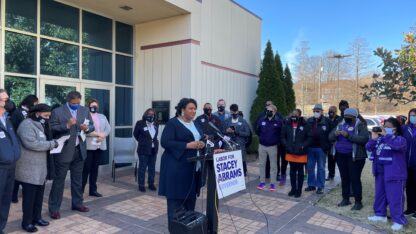Gov. Brian Kemp is another step closer to possibly expanding health care coverage for low-income Georgians.
The state Senate passed a bill Tuesday that would give Kemp the latitude to seek a waiver to Georgia’s Medicaid program that might cover more people.
“I know that [the Legislature’s] giving me a lot of authority with this, but we’re going to move forward, and we’re going to be transparent with them as we’re doing that. We’re going to find the best solutions,” Kemp told reporters Tuesday.
The measure, which passed with little support from Democrats, would empower the governor to work with state officials to pitch two kinds of waivers to the federal government.
One would ask for Medicaid dollars to go to local programs that tweak the requirements of the federal health insurance program. Another would aim to reduce costs for consumers who buy insurance on the Affordable Care Act exchange.
But, for now, there’s not much clarity on what those waiver requests might look like, what kinds of programs they might fund or how many people they might impact.
That’s a major concern for state Sen. Steve Henson.
“We could be doing a plan that covers 15,000 or 20,000 or 30,000. That’s problematic, as a legislative body, that we don’t know what we’re doing,” he said during a floor debate on the bill that lasted more than two hours.
Other Democrats argued, as they have before, that any Medicaid waiver program would cover fewer people at a higher cost than expansion of the federal health care program as laid out under the Affordable Care Act.
Much of the debate Tuesday centered around a provision of the bill that would limit income eligibility for any Medicaid waiver program to 100 percent of the federal poverty level.
Opponents worry that would limit federal money coming into the state to fund a waiver program.
Still, many of the bill’s Republican supporters argued any coverage expansion would be good for Georgians, especially after years of inaction when it comes to Medicaid.
“We are literally taking a bite out of the apple,” said state Sen. Renee Unterman. “Is it the biggest bite you could take? No. But look at the past four years: we haven’t even bitten the apple. So, some progress is better than no progress.”
From here, the bill heads to the state House for consideration.









